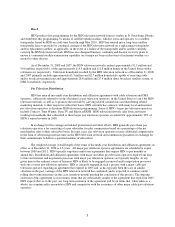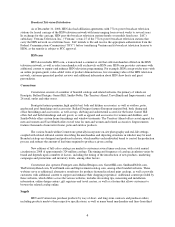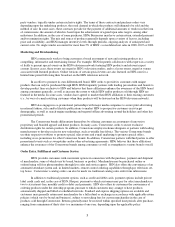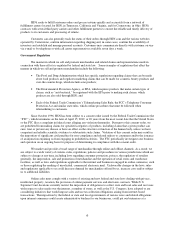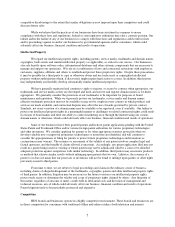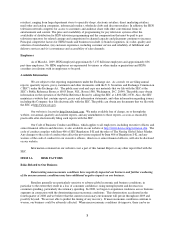Home Shopping Network 2008 Annual Report Download - page 16
Download and view the complete annual report
Please find page 16 of the 2008 Home Shopping Network annual report below. You can navigate through the pages in the report by either clicking on the pages listed below, or by using the keyword search tool below to find specific information within the annual report. 13
Failure to comply with existing laws, rules and regulations, or to obtain and maintain required licenses
and rights, could subject us to additional liabilities.
We market and provide a broad range of merchandise through online and offline channels. As a result, we
are subject to a wide variety of statutes, rules, regulations, policies and procedures in various jurisdictions which are
subject to change at any time, including laws regarding consumer protection, privacy, the regulation of retailers
generally, the importation, sale and promotion of merchandise and the operation of retail stores and warehouse
facilities, as well as laws and regulations applicable to the internet and businesses engaged in online commerce, such
as those regulating the sending of unsolicited, commercial electronic mail. Our failure and/or the failure of any of
our businesses to comply with these laws and regulations could result in fines and/or proceedings against us and/or
our businesses by governmental agencies and/or consumers, which could adversely affect our business, financial
condition and results of operations. Moreover, unfavorable changes in the laws, rules and regulations applicable to
us could decrease demand for merchandise offered by us, increase costs and/or subject us to additional liabilities.
Finally, certain of these regulations impact the marketing efforts of our brands and businesses.
We could be subject to additional sales tax collection obligations.
U.S. Supreme Court decisions currently restrict the imposition of obligations to collect state and local sales
and use taxes with respect to sales made over the internet. However, a number of states, as well as the U.S.
Congress, have adopted or are considering initiatives that would impose sales and use tax collection obligations
arising from internet-based transactions. If these initiatives are successful, we could be required to collect sales and
use taxes in additional states. The imposition by state and local governments of various taxes upon internet
commerce could create administrative burdens for us, put us at a competitive disadvantage if they do not impose
similar obligations on all online competitors and decrease our future sales.
System interruption and the lack of integration and redundancy in these systems and infrastructures
may adversely affect our ability to operate websites, process and fulfill transactions, respond to customer
inquiries and generally maintain cost-efficient operations.
Our success depends, in part, on our ability to maintain the integrity of our systems and infrastructures,
including websites, information and related systems, call centers and fulfillment facilities. We may experience
occasional system interruptions that make some or all systems or data unavailable or prevent our businesses from
efficiently providing services or fulfilling orders. We also rely on affiliate and third-party computer systems,
broadband and other communications systems and service providers in connection with the provision of services
generally, as well as to facilitate, process and fulfill transactions. Any interruptions, outages or delays in our
systems and infrastructures, our businesses, our affiliates and/or third parties, or deterioration in the performance of
these systems and infrastructures, could impair the ability of our businesses to provide services, fulfill orders and/or
process transactions. Fire, flood, power loss, telecommunications failure, hurricanes, tornadoes, earthquakes, acts of
war or terrorism, acts of God and similar events or disruptions may damage or interrupt computer, broadband or
other communications systems and infrastructures at any time. Any of these events could cause system interruption,
delays and loss of critical data, and could prevent our businesses from providing services, fulfilling orders and/or
processing transactions. While we have backup systems for certain aspects of our operations, these systems are not
fully redundant and disaster recovery planning is not sufficient for all eventualities. In addition, we may not have
adequate insurance coverage to compensate for losses from a major interruption.
Our business is subject to online security risks, including security breaches and identity theft.
To succeed, we must be able to provide for secure transmission of confidential information over public
networks. Our failure, and/or the failure by the various third party vendors and service providers with which we do
business, to comply with applicable privacy policies or federal, state or similar international laws and regulations or
any compromise of security that results in the unauthorized release of personally identifiable information or other
user data could damage the reputation of these businesses, discourage potential users from trying our products and
services and/or result in fines and/or proceedings by governmental agencies and/or consumers, one or all of which
could adversely affect our business, financial condition and results of operations. Any penetration of network
security or other misappropriation or misuse of personal consumer information could cause interruptions in the
operations of our businesses and subject us to increased costs, litigation and other liabilities. Security breaches


